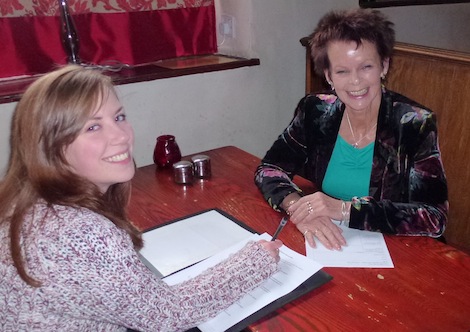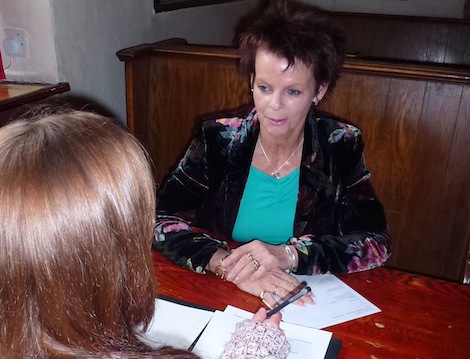 Abraham Lincoln
If given the truth, the people can be depended upon to meet any national crisis...
Abraham Lincoln
If given the truth, the people can be depended upon to meet any national crisis...
 Guildford news...
for Guildford people, brought to you by Guildford reporters - Guildford's own news service
Guildford news...
for Guildford people, brought to you by Guildford reporters - Guildford's own news service
Guildford’s MP, Anne Milton Talks About Her New Role As A Government Whip
Published on: 24 Feb, 2013
Updated on: 25 Feb, 2013
Anne Milton MP found time in her busy schedule to be interviewed by The Guildford Dragon NEWS on her new role as a government whip a job she was given last September in a government reshuffle. Before that she was the Minister for Public Health. Mrs Milton was interviewed by Kathryn Braid.
How are you finding your new position as a Government Whip?
It’s very different. The Government Whip’s job is to make sure the Government of the day gets its business through the House of Commons. So, as we all know, the Queen’s Speech announces the Government’s legislative programme for the following year; saying what Bills are going to be brought forward and it’s down to us whips to make sure that happens.
We also take care of the health and welfare of MPs. We sound out the MPs about how they feel about what is going on in Parliament, and what the Government is doing – what they are happy about and what they are unhappy about – communicating messages up and messages down. The whips are the eyes and ears of the party.
It is a very different job and is very much in the thick of things. Being in the Department of Health, I focused upon health when in the House of Commons. Now, I know a bit about everything. I am very much a people person, so I enjoy it. It is nice being in the centre of things after doing the health job for two years in opposition and two years in Government.
What do you actually do as a Government Whip? Is the job all about ensuring the party members vote in support of the Government, or are there other tasks?
Yes, the main job of the whips is to make sure that the business of Government is done through the ‘usual channels’ as we are referred to. In practice this means organising maximum support for the Government in certain votes.
We normally achieve this through explanation and persuasion. We are not really ‘street corner thugs that have to be got past on your way to school’, as Jeremy Paxman once described us.
But we are there to keep some discipline and where a vote is really important ‘a three-line whip’ is declared. Defying that is a very serious party matter.
We also sometimes act as tellers [those who count MPs’ votes], select members for committees and manage ‘pairing’ with opposition whips [to balance numbers of members who need to be absent from parliamentary votes so that the outcome is unaffected].
Another important part of our work is to communicate between the Government and the backbenchers. It is very important that they know how feelings are running on the issues of the day.
My official title is Lord Commissioner of HM Treasury and I am one of six Government whips that come under the chief whip and his deputies, and above the seven MPs who are assistant whips.
Within the team we specialise in different subject matters and are allocated groups of MPs, known as our flock, to look after.
It is actually a very interesting job where one certainly learns how Parliament works.
How is the whip enforced? What do you do to persuade MPs to support the government?
Talk to them, find out what the problem is or explain the areas that are causing the problem. You have to abide by the rules of the political party that you stand with. Politics is a bit of a compromise. The stories often circulated about whips are exaggerated.
What can be done if, despite the whip’s persuasion, the MP refuses to alter their position?
The extreme is to withdraw the whip – in effect expelling them from the party. Ideally, we don’t get to this stage, often a fuller explanation of what the Government is trying to achieve can help. Withdrawing the whip is only done in extreme circumstances and done in consultations with a number of people.
Are there any information files kept on MPs that whips are able to use?
I couldn’t possibly comment.
As a whip do you find yourself constantly monitoring party voting or are you able to spend time on other matters in Government?
You do get the opportunity to do other things, both in Government but all importantly, constituency work remains the priority.
How do you respond to people who consider the whip to be undemocratic?
Party politics is part of our democracy. People stand with a political party on the ballot paper, although we are in new territory because of the Coalition.
What percentage of your time can you give to constituency business?
As much as is needed, but I do have a busy constituency so as much time as possible.
What happens if you personally disagree with a Government policy or feel it is not in your constituents’ interest?
If you are a member of the Government and wanted to vote against the Government you would have to resign.
You were obviously very passionate about health issues. How disappointed were you to lose the Health Minister portfolio?
I enjoy the change, it is good to move, good to have a change.
As a constituency MP, what are your views on the referendum due after the next election on Britain’s relationship with the EU?
I think David Cameron has done absolutely the right thing. He has given people a real choice. It is good for both, those who are in favour of Europe and good for those who want us to leave. It is time we restated the case on both sides and let the public make a choice.
How do you feel about the number of women currently in Mr Cameron’s cabinet? Do you feel there is anything the Government could be doing to involve more women?
The number of women Conservative MPs on the Conservative benches was up substantially in the 2010 election and we will continue to see more women in senior positions. We always need to do more to encourage women to get involved in politics.
The Guildford Dragon NEWS recently published an article [click here to view] discussing internet shopping’s growing influence on the face of Guildford High Street. How do you think the internet is changing the way we shop and what do you think this will mean for town centres – specifically Guildford town centre?
How we shop has changed dramatically during my lifetime. When I was little not everyone had a fridge, almost no one had a freezer. My mother shopped for food every day. The big rise in internet shopping means we will see yet more changes, possibly with shops becoming more like showrooms. If you look at shopping models like Argos – part catalogue, part internet, part high street shops – I think we will see more new models of shopping.
What do you think can be done to improve the relationship between ‘town and gown’ in Guildford?
I set up regular meetings between local residents and the University of Surrey. The meetings help local people understand what the University is doing here and gives them a chance to listen to the local residents’ concerns. We have made a lot of progress and the University has clearly also benefited from their active support.
Finally, what are your future hopes for the Guildford constituency and your career in Parliament?
I hope to enjoy myself as Guildford’s MP as much as I have done the past seven years! It has been a great second career and a fantastic job. I am very lucky to have the constituency I do. It is both town and country, busy and rural. One end is Cranleigh, and the other end is the bustle of Guildford town.

Interview over – all smiles – no whipping required. Photographs taken, with kind permission, in Ye Olde Ship Inn, Portsmouth Road, Guildford.

Click on cartoon for Dragon story: Public Asked for Views on SCC’s Proposal for Reduced Speed Limits



Recent Articles
- Breast Screening Unit Comes To RHS Wisley
- Final Phase of Deepcut Redevelopment Approved
- GuilFest Returns to Stoke Park with Global Names and Local Soul
- Exercise May Aid Body’s Immune Response Against Cancer, Pilot Study Finds
- Letter: How Surveys of Public Opinion Should Be Organised
- Updated: Catapult Attacks, Shoplifting and Graffiti – the ASB Problem That Ash Is Facing
- A281 Closure Expected to Continue
- Guildford’s Green Day Shows Commitment to Net Zero by 2030 Remains
- Letter: We Should All Have a Say in How Our Local Government Is Reorganised
- Dragon Review: Madam Butterfly – Grange Park Opera


Search in Site
Media Gallery
Dragon Interview: Local Artist Leaves Her Mark At One of England’s Most Historic Buildings
January 21, 2023 / No Comment / Read MoreDragon Interview: Lib Dem Planning Chair: ‘Current Policy Doesn’t Work for Local People’
January 19, 2023 / No Comment / Read MoreA3 Tunnel in Guildford ‘Necessary’ for New Homes, Says Guildford’s MP
January 10, 2023 / No Comment / Read More‘Madness’ for London Road Scheme to Go Ahead Against ‘Huge Opposition’, Says SCC Leader
January 6, 2023 / No Comment / Read MoreCouncillor’s Son Starts Campaign for More Consultation on North Street Plan
December 30, 2022 / No Comment / Read MoreCounty Council Climbs Down Over London Road Works – Further ‘Engagement’ Period Announced
December 14, 2022 / No Comment / Read MoreDragon Interview: GBC Reaction to the Government’s Expected Decision to Relax Housing Targets
December 7, 2022 / No Comment / Read MoreHow Can Our Town Centre Businesses Recover? Watch the Shop Front Debate
May 18, 2020 / No Comment / Read More







Recent Comments